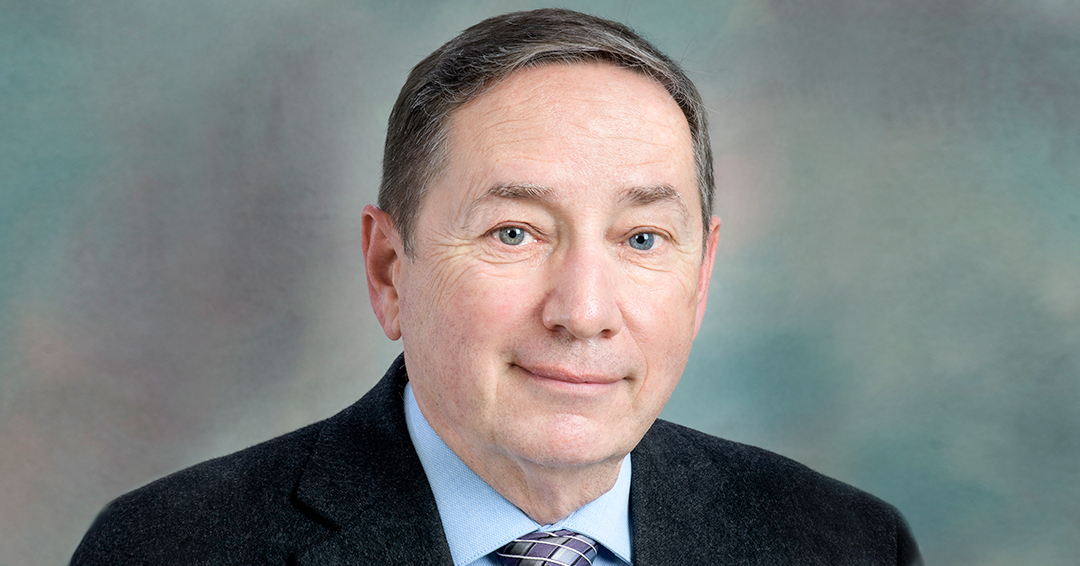
Part of our series: FMHS community members from away – The Faculty of Medicine and Health Sciences (FMHS) is made up of diverse communities, including people from across Canada and around the world. This series recognizes those from outside the province who have chosen to bring their talents and expertise to McGill University. Thank you for all that you contribute!
It’s 2:30 in the afternoon and Jean-Pierre Farmer, MDCM, has just spent five hours in the operating room performing surgery on a three-month-old baby with sagittal craniosynostosis, a bone condition that causes skull deformity and potentially increased pressure on the infant’s brain, limiting its growth. Today’s procedure brings the total number of surgeries the head of Pediatric Neurosurgery at the McGill University Health Centre, and immediate past Surgeon-in-Chief at the Montreal Children’s Hospital has performed in his 33-year career to well over 5,000.
“It’s a big milestone,” admits Dr. Farmer, a native Franco-Ontarian who moved to Montreal after the completion of the 1976 Olympic games, to begin an undergraduate degree in Neurophysiology, which would eventually lead to an MDCM degree, with a focus in neurophysiology from McGill. He received his neurosurgery training at McGill, and then acquired fellowship training in pediatric neurosurgery from the New York University Medical Centre.
Another milestone in Dr. Farmer’s distinguished career is his involvement in developing the first intraoperative MRI (iMRI) system for children in Canada in 2009. Neurosurgeons rely on iMRItechnology to obtain accurate maps of the brain and navigational guidance to help them remove brain tumours, and treat other conditions such as epilepsy more completely, yet with more safety.
The latest piece of medical equipment to make its way into neurosurgery at the Montreal Children’s Hospital is a robot that guides the passage of electrodes into the brain to identify where seizures start. “If you are to help patients with a surgical procedure, you have to find where the seizure origin is, and sometimes that’s relatively easily done with surface electrodes, or because there’s a particular abnormality on the MRI. However, often it’s more complicated than that. With this robot we’re able to implant electrodes in certain areas based on how the seizure manifests itself, and determine the seizure onset zone and its propagation pattern,” Dr. Farmer explains.
While making sure neurosurgeons have the latest technology at their disposal to help children, Dr. Farmer has also been actively recruiting talented colleagues. “We have recruited Dr. Jeffrey Atkinson from Ontario who came to McGill to study neurosurgery. Dr. Atkinson also went to Salt Lake City for his fellowship and returned to Montreal in 2003 as a pediatric neurosurgeon at the Montreal Children’s Hospital. He has been the neurosurgery residency program director for the last 12 years. In 2014, we recruited Dr. Roy Dudley who had come to McGill to do a PhD in neuromuscular diseases. Following medical school at Memorial University he returned to McGill for residency and did his fellowship in pediatric neurosurgery in Denver, Colorado. He has been working as a pediatric neurosurgeon and a neuroscientist since 2014. All three of us are bringing up our families in Montreal. My two colleagues communicate with their patients or families either in French or English in a seamless fashion.”
When he assumed his newest role as Associate Vice-Principal and Vice-Dean (Health Affairs) in January 2023, Dr. Farmer brought with him a set of priorities. One is to make sure trainees and professors can address patients in French. “It’s something that I think everybody is sensitized to at McGill. The large majority of patients treated in our hospitals are francophone. It’s important to be able to communicate with patients and families facing illness in the language of their choice. It’s part of our social accountability as a medical school to provide for the needs of the community.
“Many of the meetings held in the medical school are conducted in French. When we interact with the other medical schools in Quebec, or with the ministries of the government, communication is exclusively in French,” noted Dr. Farmer.
“A fourth pediatric neurosurgeon will join our ranks in January 2024. Nobody from Quebec residency programs applied to this position. He is European trained, has a PhD in neurophysiology, has spent two years in fellowship with us. He speaks six languages including impeccable French and will be an excellent clinician-scientist and neurosurgeon for Quebec children.
“What I’m saying is that there are many examples of people coming from elsewhere who study here, love it here, stay here, bring up their families here, help generations of patients here, and make significant contributions to Quebec society.”
Related:
Roy Dudley – On a mission to eradicate epileptic seizures at home and abroad
